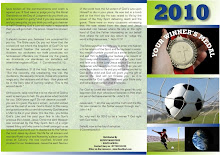This is the first blogpost of information made available from the seminar that took place in Hillcrest (near Pinetown) on Saturday 13, 2010.
‘Isa, the Muslim Jesusby
Dr Mark Durie "The word Christian is not a valid word, for there is no religion of Christianity according to Islam". — www.answering-christianity.com
Today we increasingly hear and read that Christianity and Islam ‘share’ Jesus, that he belongs to both religions. So also with Abraham: there is talk of the West’s ‘Abrahamic civilization’ where once people spoke of ‘Judeo-Christian civilization’. This shift of thinking reflects the growing influence of Islam.
These notes offer some information and reflections on the ‘Muslim Jesus’, to help put this trend in its proper context.
References in brackets are to the Qur’an. Numbering systems for the Qur’anic verses are not standardized: be prepared to search through nearby verses for the right one.
Islam the primordial faithIslam regards itself, not as a subsequent faith to Judaism and Christianity, but as the primordial religion, the faith from which Judaism and Christianity are subsequent developments. In the Qur’an we read that Abraham ‘was not a Jew nor a Christian, but he was a monotheist, a Muslim’ (Âl 'Imran 3:66). So it is Muslims, and not Christians or Jews, who are the true representatives of the faith of Abraham to the world today. (Al-Baqarah 2:135)
The Biblical prophets were all MuslimsMany prophets of the past received the one religion of Islam. (Ash-Shura 42:13) Who were these previous prophets? According to Al-An’am 6:85-87 they include Ibrahim (Abraham), ‘Ishaq (Issac), Yaqub (Jacob), Nuh (Noah), Dawud (David), Sulaiman (Solomon), Ayyub (Job), Yusuf (Joseph), Musa (Moses), Harun (Aaron), Zakariyya (Zachariah), Yahya (John the Baptist), ‘Isa (Jesus), Ilyas, Ishmael, Al-Yash’a (Elisha), Yunus (Jonah) and Lut (Lot).
The Muslim ‘Isa (Jesus)There are two main sources for ‘Isa, the Muslim Jesus. The Qur’an gives a history of his life, whilst the Hadith collections — recollections of Muhammad’s words and deeds — establish his place in the Muslim understanding of the future.
The Qur’an‘Isa, was a prophet of IslamJesus’ true name, according to the Qur’an, was ‘Isa. His message was pure Islam, surrender to Allah. (Âl 'Imran 3:84) Like all the Muslim prophets before him, and like Muhammad after him, ‘Isa was a lawgiver, and Christians should submit to his law. (Âl 'Imran 3:50; Al-Ma’idah 5:48) ‘Isa’s original disciples were also true Muslims, for they said ‘We believe. Bear witness that we have surrendered. We are Muslims.’ (Al-Ma’idah 5:111)
‘The Books’Like other messengers of Islam before him, ‘Isa received his revelation of Islam in the form of a book. (Al-An’am 6:90) ‘Isa’s book is called the Injil or ‘gospel’. (Al-Ma’idah 5:46) The Torah was Moses’ book, and the Zabur (Psalms) were David’s book. So Jews and Christians are ‘people of the Book’. The one religion revealed in these books was Islam. (Âl 'Imran 3:18)
As with previous prophets, ‘Isa’s revelation verified previous prophets’ revelations. (Âl 'Imran 3:49,84; Al-Ma’idah 5:46; As-Saff 61:6) Muhammad himself verified all previous revelations, including the revelation to ‘Isa (An-Nisa’ 4:47), and so Muslims must believe in the revelation which ‘Isa received. (Al-Baqarah 2:136) However, after ‘Isa the Injil was lost in its original form. Today the Qur’an is the only sure guide to ‘Isa’s teaching.
The biography of ‘IsaAccording to the Qur’an, ‘Isa was the Messiah. He was supported by the ‘Holy Spirit’. (Al-Baqarah 2:87; Al-Ma’idah 5:110) He is also referred to as the ‘Word of Allah’. (An-Nisa’ 4:171)
‘Isa’s mother Mariam was the daughter of ‘Imran, (Âl 'Imran 3:34,35) — cf the Amram of Exodus 6:20 — and the sister of Aaron (and Moses). (Maryam 19:28) She was fostered by Zachariah (father of John the Baptist). (Âl 'Imran 3:36) While still a virgin (Al-An’am 6:12; Maryam 19:19-21) Mariam gave birth to ‘Isa alone in a desolate place under a date palm tree. (Maryam 19:22ff) (Not in Bethlehem).
‘Isa spoke whilst still a baby in his cradle. (Âl 'Imran 3:46; Al-Ma’idah 5:110; Maryam 19:30) He performed various other miracles, including breathing life into clay birds, healing the blind and lepers, and raising the dead. (Âl 'Imran 3:49; Al-Ma’idah 5:111) He also foretold the coming of Muhammad. (As-Saff 61:6)
‘Isa did not die on a crossChristians and Jews have corrupted their scriptures. (Âl 'Imran 3:74-77, 113) Although Christians believe ‘Isa died on a cross, and Jews claim they killed him, in reality he was not killed or crucified, and those who said he was crucified lied (An-Nisa’ 4:157). ‘Isa did not die, but ascended to Allah. (An-Nisa’ 4:158) On the day of Resurrection ‘Isa himself will be a witness against Jews and Christians for believing in his death. (An-Nisa’ 4:159)
Christians should accept Islam, and all true Christians willChristians (and Jews) could not be freed from their ignorance until Muhammad came bringing the Qur’an as clear evidence (Al-Bayyinah 98:1). Muhammad was Allah’s gift to Christians to correct misunderstandings. They should accept Muhammad as Allah’s Messenger, and the Qur’an as his final revelation. (Al-Ma’idah 5:15; Al-Hadid 57:28; An-Nisa’ 4:47)
Some Christians and Jews are faithful and believe truly. (Âl 'Imran 3:113,114) Any such true believers will submit to Allah by accepting Muhammad as the prophet of Islam, i.e. they will become Muslims. (Âl 'Imran 3:198)
Although Jews and pagans will have the greatest enmity against Muslims, it is the Christians who will be ‘nearest in love to the believers’, i.e. to Muslims. (Al-Ma’idah 5:82) True Christians will not love Muhammad’s enemies. (Al-Mujadilah 58:22) In other words, anyone who opposes Muhammad is not a true Christian.
Christians who accept Islam or refuse itSome Jews and Christians are true believers, accepting Islam: most are transgressors. (Âl 'Imran 3:109)
Many monks and rabbis are greedy for wealth and prevent people from coming to Allah. (At-Taubah 9:34,35)
Christians and Jews who disbelieve in Muhammad will go to hell. (Al-Bayyinah 98:6)
Muslims should not take Christians or Jews for friends. (Al-Ma’idah 5:51) They must fight against Christians and Jews who refuse Islam until they surrender, pay the poll-tax and are humiliated. (At-Taubah 9:29) To this may be added hundreds of Qur’anic verses on the subject of jihad in the path of Allah, as well as the ‘Book of Jihad’ found in all Hadith collections.
Christian beliefsChristians are commanded not to believe that ‘Isa is the son of God: ‘It is far removed from his transcendent majesty that he should have a son’. (An-Nisa’ 4:171; Al-Furqan 25:2) ‘Isa was simply a created human being, and a slave of Allah. (An-Nisa’ 4:172; Âl 'Imran 3:59)
Christians are claimed by the Qur’an to believe in a family of gods — Father God, mother Mary and ‘Isa the son — but ‘Isa rejected this teaching. (Al-Ma’idah 5:116) The doctrine of the Trinity is disbelief and a painful doom awaits those who believe it. (Al-Ma’idah 5:73)
‘Isa (Jesus) in the Hadith‘Isa the destroyer of ChristianityThe prophet ‘Isa will have an important role in the end times, establishing Islam and making war until he destroys all religions save Islam. He shall kill the Evil One (Dajjal), an apocalyptic anti-Christ figure.
In one tradition of Muhammad we read that no further prophets will come to earth until ‘Isa returns as ‘a man of medium height, or reddish complexion, wearing two light garments, looking as if drops were falling down from his head although it will not be wet. He will fight for the cause of Islam. He will break the cross, kill pigs, and abolish the poll-tax. Allah will destroy all religions except Islam. He (‘Isa) will destroy the Evil One and will live on the earth for forty years and then he will die’. (Sunan Abu Dawud, 37:4310) The Sahih Muslim has a variant of this tradition: ‘The son of Mary ... will soon descend among you as a just judge. He will ... abolish the poll-tax, and the wealth will pour forth to such an extent that no one will accept charitable gifts.’ (Sahih Muslim 287)
What do these sayings mean? The cross is a symbol of Christianity. Breaking crosses means abolishing Christianity. Pigs are associated with Christians. Killing them is another way of speaking of the destruction of Christianity. Under Islamic law the poll-tax buys the protection of the lives and property of conquered ‘people of the Book’. (At-Taubah 9:29) The abolition of the poll-tax means jihad is restarted against Christians (and Jews) living under Islam, who should convert to Islam, or else be killed or enslaved. The abundance of wealth refers to booty flowing to the Muslims from this conquest. This is what the Muslim ‘Isa will do when he returns in the last days.
Muslim jurists confirm these interpretations: consider, for example, the ruling of Ahmad ibn Naqib al-Misri (d. 1368).
"... the time and the place for [the poll tax] is before the final descent of Jesus (upon whom be peace). After his final coming, nothing but Islam will be accepted from them, for taking the poll tax is only effective until Jesus' descent (upon him and our Prophet be peace) ..." (The Reliance of the Traveller. Trans. Nuh Ha Mim Keller, p. 603).
Ibn Naqib goes on to state that when Jesus returns, he will rule ‘as a follower’ of Muhammad.
Critical Comments on the Muslim ‘Isa (Jesus)‘Isa not an historical figureThe Qur’an’s ‘Isa is not an historical figure. His identity and role as a prophet of Islam is based solely on supposed revelations to Muhammad over half a millennium after the Jesus of history lived and died.
Jesus’ name was never ‘Isa
Jesus’ mother tongue was Aramaic. In his own lifetime he was called Yeshua in Aramaic, and Jesu in Greek. This is like calling the same person John when speaking English and Jean when speaking French: Jesu, pronounced "Yesoo", is the Greek form of Aramaic Yeshua. (The final -s in Jesu-s is a Greek grammatical ending.) Yeshua is itself a form of Hebrew Yehoshua’, which means ‘the Lord is salvation’. However Yehoshua’ is normally given in English as Joshua. So Joshua and Jesus are variants of the same name.
It is interesting that Jesus' name Yehoshua’ contains within it the proper Hebrew name for God, the first syllable Yeh- being short for YHWH ‘the LORD’.
Yeshua of Nazareth was never called ‘Isa, the name the Qur’an gives to him. Arab-speaking Christians refer to Jesus as Yasou’ (from Yeshua) not ‘Isa.Jesus did not receive a ‘book’According to the Qur’an, the ‘book’ revealed to ‘Isa was the
Injil. The word
Injil is a corrupted form of the Greek
euanggelion ‘good news’ or
gospel. What was this
euanggelion? This was just how Jesus referred to his message: as good news. The expression euanggelion did not refer to a fixed revealed text, and there is absolutely no evidence that Jesus received a ‘book’ of revelation from God.
The ‘gospels’ of the Bible are biographiesThe term
euanggelion later came to be used as a title for the four biographies of Jesus written by Matthew, Mark, Luke and John, the ‘gospels’. This was a secondary development of meaning. Apparently this is where Muhammad got his mistaken idea of the
Injil being a ‘book’.
Most so-called prophets of Islam received no bookVirtually all of the so-called ‘prophets’ of Islam, whose names are taken from the Hebrew scriptures, received no ‘book’ or law code. For example, the Psalms are not a book revealing Islam, as the Qur’an claims, but a collection of songs of worship, only some of which are David’s. There is not a shred of evidence in the Biblical history of David that he received a book of laws for the Israelites. They already had the Torah of Moses to follow. So David was not a prophet in the Qur’an’s sense of this word. Likewise most of the prophets claimed by Islam were neither lawgivers nor rulers.
Biblical prophecy and Islamic prophecy are not the same thingThe Biblical understanding of prophecy is quite different from Muhammad’s. A Biblical prophecy is not regarded as a passage from a heavenly eternally pre-existent text like the Qur’an, but a message from God for a specific time and place. A biblical prophet is someone to whom God reveals hidden things, and who then acts as God’s verbal agent. When a Samaritan woman called Jesus a prophet (John 4:19) it was because he had spoken about things in her life that he could only have known supernaturally. Christianity teaches that Jesus was a prophet, but he brought no ‘book’: he himself was the living ‘Word of God’, a title used of ‘Isa in the Qur’an.
By no means all prophecies referred to in the Bible became part of the Biblical text. The Bible consists of a wide variety of materials originally written for many different purposes, including letters, songs, love poetry, historical narratives, legal texts, proverbial wisdom as well as prophetic passages. These are regarded as inspired by God, but not dictated from a timeless heavenly book.
As prophetic history, the Qur’an contains many errors and anachronismsThe claim that Jesus was not executed by crucifixion is without any historical support. One of the things that all the early sources agree on is Jesus’ crucifixion.
Mariam the mother of ‘Isa is called a sister of Aaron, and also the daughter of Aaron’s father ‘Imran (Hebr. Amram). Clearly Muhammad has confused Mary (Hebr. Miriam) with Miriam of the Exodus. The two lived more than a thousand years apart!
In the Bible Haman is the minister of Ahasuerus in Media and Persia (The Book of Esther 3:1-2). Yet the Qur’an places him over a thousand years earlier, as a minister of Pharoah in Egypt.
The claim that Christians believe in three Gods — Father, son Jesus and mother Mary — is mistaken. The Qur’an is also mistaken to claim that Jews say Ezra was a son of God. (At-Taubah 9:30) The charge of polytheism against Christianity and Judaism is ill-informed and false. (Deuteronomy 6:4, James 2:19a)
The story of the ‘two horned one’ (Al-Kahf 18:82 cf also Daniel 8:3, 20-21) is derived from the Romance of Alexander. Certainly Alexander the Great was no Muslim.
The problem with the name ‘Isa has already been discussed. Other Biblical names are also misunderstood in the Qur’an, and their meanings lost. For example Elisha, which means ‘God is salvation’, is given in the Qur’an as
al-Yash’a, turning
El ‘God’ into
al- ‘the’. (Islamic tradition did the same to Alexander the Great, calling him
al-Iskandar ‘the Iskander’). Abraham ‘Father of many’ (cf Genesis 17:5) might have been better represented as something like
Aburahim ‘father of mercy’ instead of Ibrahim, which has no meaning in Arabic at all.
The Qur’an has a Samaritan making the golden calf, which was worshipped by the Israelites in the wilderness (Ta Ha 20:85) during the Exodus. In fact it was Aaron (Exodus 34:1-6). The Samaritans did not exist until several centuries later. They were descendants of the northern Israelites centuries after the Exodus.
Many Qur’anic stories can be traced to Jewish and Christian folktales and other apocryphal literature. For example a story of Abraham destroying idols (As-Saffat 37) is found in a Jewish folktale, the Midrash Rabbah. The Qur’anic story of Zachariah, father of John the Baptist, is based upon a second-century Christian fable. The story of Jesus being born under a palm tree is also based on a late fable, as is the story of Jesus making clay birds come alive. Everything the Qur’an says about the life of Jesus which is not found in the Bible can be traced to fables composed more than a hundred years after Jesus’ death.
Jesus’ titles of Messiah and Word of God, which the Qur’an uses, find no explanation in the Qur’an. Yet in the Bible, from which they are taken, these titles are well integrated in a whole theological system.
The Qur’an mentions the Holy Spirit in connection with Jesus, using phrases which come from the gospels. Ibn Ishaq (
Life of Muhammad) reports Muhammad as saying that this ‘Spirit’ was the angel Gabriel (cf also An-Nahl 16:102, Al-Baqarah 2:97). However the Biblical phrase ‘Spirit of God’ (Ruach Elohim) or ‘Holy Spirit’ can only be understood in light of the Hebrew scriptures. It certainly does not refer to an angel.
Jesus’ alleged foretelling of Muhammad’s coming (As-Saff 61:6) appears to be based on a garbled reading of John 14:26, a passage which in fact refers to the Spirit.
The Hebrew scriptures were Jesus’ Bible. He affirmed their authority and reliability and preached from them. From these same scriptures he knew God as
Adonai Elohim, the Lord God of Israel. He did not call God
Allah, which appears to have been the name or title of a pagan Arabian deity worshipped in Mecca before Muhammad. Muhammad's pagan father, who died before Muhammad was born, already bore the name
‘Abd Allah ‘slave of Allah’, and his uncle was called
Obeid Allah.
We read that An-Najm 53:19-23 seeks to refute the pagan Arab belief that Allah had daughters named al-Uzza, al-Ilat and Manat. (See also An-Nahl 16:57 and Al-An’am 6:100).
The Biblical narratives are rich with historical details, many confirmed by archaeology. They cover more than a thousand years, and reveal a long process of technological and cultural development. In contrast the Qur’an’s sacred history is devoid of archaeological support. Its fragmentary and disjointed stories offer no authentic reflection of historical cultures. No place name from ancient Israel is mentioned, not even Jerusalem. Many of the supposed historical events reported in the Qur’an have no independent verification. For example we are told that Abraham and Ishmael built the Kaaba in Mecca (Al-Baqarah 2:127), but this is totally without support. The Biblical account, more than a thousand years older, does not place Abraham anywhere near Arabia.
The Qur’an is not a credible source for Biblical historyThe Qur’an, written in the 7th century AD, cannot be regarded as having any authority whatsoever to inform us about Jesus of Nazareth. It offers no evidence for its claims about biblical history. Its numerous historical errors reflect a garbled understanding of the Bible.
Islam appropriates the history of Judaism and Christianity to itselfWhen Muhammad linked the name of
Allah to the religious histories of Judaism and Christianity, this was a way to claim them for Islam. In the light of later events, the claim that Islam was the original religion, and that all preceding prophets were Muslims, can be regarded as an attempt to appropriate the histories of other religions for Islam. The effect is to rob Christianity and Judaism of their own histories.
Consider that many Biblical sites, such as the tombs of the Hebrew Patriarchs and the Temple Mount, are claimed by Islam as Muslim sites, not Jewish or Christian ones. After all, the Qur’an tells us that Abraham ‘was a Muslim’. Under Islamic rule all Jews and Christians were banned from such sites.
The place of the Jewish scriptures in Christianity is completely different from the place of the Bible in IslamThere is a fundamental difference between Christian attitudes to the Jewish scriptures and Islamic attitudes to the Bible. Christians accept the Hebrew scriptures. They were the scriptures of Jesus and the apostles. They were the scriptures of the early church. The whole of Christian belief and practice rests upon them. Core Christian concepts such as ‘Messiah’ (Greek ‘Christos’), ‘Spirit of God’, ‘Kingdom of God’ and ‘salvation’ are deeply rooted in the Hebrew Biblical traditions.
We note also that Christian seminaries devote considerable effort to studying the Hebrew scriptures. This is an integral part of training for Christian ministry. The Hebrew scriptures are read (in translation) every Sunday in many churches all around the world.
In contrast Islam’s treatment of the Bible is one of complete disregard. Although it purports to ‘verify’ all earlier prophetic revelation, the Qur’an is oblivious to the real contents of the Bible. The claim that Christians and Jews deliberately corrupted their scriptures is made without evidence, and this only serves to cover up the Qur’an’s historical inadequacies. Muslim scholars rarely have an informed understanding of the Bible or of biblical theology and so remain ignorant of these realities.
Some contemporary Muslim voices on JesusYasser Arafat, addressing a press conference at the United Nations in 1983 called Jesus "the first Palestinian fedayeen who carried his sword" (i.e. he was a freedom fighter for Islam).
Sheikh Ibrahim Madhi, employee of the Palestinian Authority, broadcast live in April 2002 on Palestinian Authority television: "The Jews await the false Jewish messiah, while we await, with Allah's help... Jesus, peace be upon him. Jesus's pure hands will murder the false Jewish messiah. Where? In the city of Lod, in Palestine."
Author Shamim A. Siddiqi of Flushing, New York put the classical position of Islam towards Christianity clearly in a recent letter to Daniel Pipes, New York Post columnist:
"Abraham, Moses, Jesus, and Muhammad were all prophets of Islam. Islam is the common heritage of the Judeo-Christian-Muslim community of America, and establishing the Kingdom of God is the joint responsibility of all three Abrahamic faiths. Islam was the din (faith, way of life) of both Jews and Christians, who later lost it through human innovations. Now the Muslims want to remind their Jewish and Christian brothers and sisters of their original din [religion]. These are the facts of history."
This historical negationism — appearing to affirm Christianity and Judaism whilst in fact rejecting and supplanting them — is a lynchpin of Muslim apologetics. What is being affirmed is in fact neither Christianity nor Judaism, but Jesus as a prophet of Islam, Moses as a Muslim etc. This is intended to lead to ‘reversion’ of Christians and Jews to Islam, which is what Siddiqi refers to when he speaks of ‘the joint responsibility’ of Jews and Christians to establish ‘the Kingdom of God’. By this he means that American Christians and Jews should work to establish shari’ah law and the rule of Islam in the United States.
Conclusion‘Isa (Jesus) of the Qur’an is a product of fable, imagination and ignorance. When Muslims venerate this ‘Isa, they have someone different in mind from the Yeshua or Jesus of the Bible and of history. The ‘Isa of the Qur’an is based on no recognized form of historical evidence, but on fables current in seventh century Arabia.
For most faithful Muslims ‘Isa is the only Jesus they know. But if one accepts this Muslim ‘Jesus’, then one also accepts the Qur’an: one accepts Islam. Belief in this ‘Isa is won at the cost of the libel that Jews and Christians have corrupted their scriptures, a charge that is without historical support. Belief in this ‘Isa implies that much of Christian and Jewish history is in fact Islamic history.
The Jesus of the gospels is the base upon which Christianity developed. By Islamicizing him, and making of him a Muslim prophet who preached the Qur’an, Islam destroys Christianity and takes over all its history. It does the same to Judaism.
In the end times as described by Muhammad, ‘Isa becomes a warrior who will return with his sword and lance. He will destroy the Christian religion and make Islam the only religion in all the world. Finally at the last judgement he will condemn Christians to hell for believing in the crucifixion and the incarnation.
This final act of the Muslim ‘Isa reflects Islam’s apologetic strategy in relation to Christianity, which is to deny the Yeshua of history, and replace him with a facsimile of Muhammad, so that nothing remains but Islam.
"The Muslim supersessionist current claims that the whole biblical history of Israel and Christianity is Islamic history, that all the Prophets, Kings of Israel and Judea, and Jesus were Muslims. That the People of the Book should dare to challenge this statement is intolerable arrogance for an Islamic theologian. Jews and Christians are thus deprived of their Holy Scriptures and of their salvific value."
— Bat Ye’or in Islam and Dhimmitude: where civilizations collide, p.370.
APPENDIX: The historical evidence for Jesus (Yeshua)
of Nazareth and his death by crucifixionNon-Christian sources for Jesus• Tacitus (AD 55-120), a renowned historical of ancient Rome, wrote in the latter half of the first century that ‘Christus ... was put to death by Pontius Pilate, procurator of Judea in the reign of Tiberius: but the pernicious superstition, repressed for a time, broke out again, not only through Judea, where the mischief originated, but through the city of Rome also.’ (Annals 15: 44).
• Suetonius writing around AD 120 tells of disturbances of the Jews at the ‘instigation of Chrestus’, during the time of the emperor Claudius. This could refer to Jesus, and appears to relate to the events of Acts 18:2, which took place in AD 49.
• Thallus, a secular historian writing perhaps around AD 52 refers to the death of Jesus in a discussion of the darkness over the land after his death. The original is lost, but Thallus’ arguments — explaining what happened as a solar eclipse — are referred to by Julius Africanus in the early 3rd century.
• Mara Bar-Serapion, a Syrian writing after the destruction of the Temple in AD 70, mentions the earlier execution of Jesus, whom he calls a ‘King’.
• The Babylonian Talmud refers to the crucifixion (calling it a hanging) of Jesus the Nazarene on the eve of the Passover. In the Talmud Jesus is also called the illegitimate son of Mary.
• The Jewish historian Josephus describes Jesus’ crucifixion under Pilate in his Antiquities, written about AD 93/94. Josephus also refers to James the brother of Jesus and his execution during the time of Ananus (or Annas) the high priest.
Paul’s Epistles• Paul’s epistles were written in the interval 20-30 years after Jesus’ death. They are valuable historical documents, not least because they contain credal confessions which undoubtedly date to the first few decades of the Christian community.
Paul became a believer in Jesus within a few years of Jesus’ crucifixion. He writes in his first letter to the Corinthians ‘For I delivered to you first of all that which I also received: that Christ died for our sins according to the Scriptures, and that He was buried, and that He rose again on the third day according to the Scriptures, and that he was seen by Cephas (Peter), then by the twelve.’ This makes clear that belief in the death of Jesus was there from the beginning of Christianity.
The four gospels• The four gospels were written down in the period 20-60 years after Jesus’ death, within living memory of the events they describe.
The events which the gospels describe for the most part took place in the full light of public scrutiny. Jesus’ teaching was followed by large crowds. There were very many witnesses to the events of his life. His death was a public execution.
Manuscript evidence for the Bible and its transmissionThe manuscript evidence for the Greek scriptures is overwhelming, far greater than for all other ancient texts. Over 20,000 manuscripts attest to them. Whilst there are copying errors, as might be expected from the hand of copyists, these are almost all comparatively minor and the basic integrity of the copying process is richly supported.
Futhermore, when Western Christians studies the Hebrew scriptures during the Renaissance, they found them to agree remarkably closely with their Greek and Latin translations which had been copied again and again over a thousand years. There were copying errors, and some other minor changes, but no significant fabrications of the stupendous scale which would be required to concoct the story of Jesus’ death.
Likewise when the Dead Sea Scrolls were discovered they included Hebrew Biblical scrolls dating from before the time of Jesus. These too agreed very closely with the oldest Hebrew Masoretic manuscripts of more than a thousand years later. Again, no fabrications, but evidence of remarkably faithful copying.
Conclusion: Jesus of Nazareth is a figure of historyClearly there are events recorded in connection with Jesus’ life that many non-Christians will not accept, such as the miracles, the virgin birth, and the resurrection. However what is beyond dispute is that Yeshua (‘Jesus’) of Nazareth was a figure of history, who lived, attracted a following in his life time amongst his fellow Jews and was executed by crucifixion by the Roman authorities, after which his followers spread rapidly. Both secular and Christian sources of the period agree on this.
The primary sources for the history of Jesus’ public life are the gospels. These were written down relatively soon after his death — within living memory — and we have every indication that these sources were accepted as reliable in the early Christian community, during a period when first and second hand witnesses to Jesus’ life were still available.
We conclude that any statements about ‘Isa (Jesus) in the Qur’an, made six centuries after Jesus’ death, must be judged against the historical evidence from these first century sources, and not vice versa.
Some useful discussions of these issues are found at:
http://www.debate.org.uk/topics/theo/islam_christ.htmlhttp://www.debate.org.uk/topics/theo/qur-jes.htmhttp://www.answering-islam.org/Intro/replacing.html





























